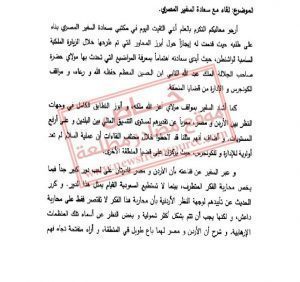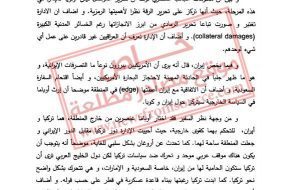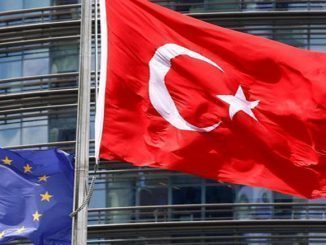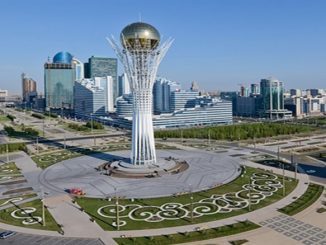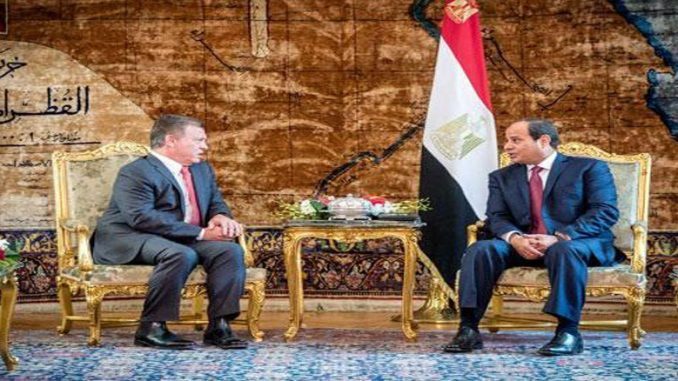
Egyptian and Jordanian ambassadors to the United States have discussed regional issues, including counter-terrorism, Saudi Arabia, Turkey, Iran, and ISIS during a meeting between them in Washington, according to a leaked document that was published by the Newkhhalij newspaper.
Egypt’s ambassador says “Saudi Arabia is incapable of combating extremist ideology “
According to the document, the Jordanian Ambassador in Washington, Dina Kawar, sent the details of the meeting to an official Jordanian body, most likely the Jordanian foreign minister in Amman.
In her account of the meeting, the Jordanian ambassador stressed that the meeting was held upon the request of the Egyptian ambassador, who showed an interest in knowing the most prominent issues discussed during Jordanian King Abdullah’s visit to the US capital.
Kawar said the Egyptian ambassador praised the Jordanian monarch’s positions and the complete harmony of the two countries’ views. He added that, “Jordan and Egypt can play a major role in combating the extremist ideology, while Saudi Arabia cannot”.
The Turkish threat is more dangerous than the Iranian threat, says Egyptian ambassador
Regarding Iran, the Egyptian ambassador said that “the US President Barack Obama chose two states from “outside” the region, Turkey and Iran, to control the region as external forces,” according to the leaked document.
He also added.” America revived Turkey’s role at the expense of Iran’s role and made the region an arena for them both to operate in.”
Also, he Jordanian ambassador confirmed that Egypt’s ambassador talked about the Turkish President Recep Tayyip Erdogan in “a very negative way”, and that he stressed the need for a joint Arab position against Turkey’s policies, “but the Gulf States believe that Turkey will protect them against Iran, especially Saudi Arabia and the UAE that are obviously moving toward Turkey.”
The Jordanian ambassador added that Egypt’s ambassador reiterated that he believes that “the Turkish threat is more dangerous than the Iranian threat.” “But the problem is the different stances of the Arab countries towards Turkey, while Jordan and Egypt agree on this point,” he added.
The Content of the leaked document is in line with Egypt’s foreign policy
In fact, the document has not been yet verified, but the content of the document is in line with Egypt’s recent foreign policy.
As for Turkey, the Egyptian-Turkish relations have deteriorated since the military coup in 2013 when Abdel Fattah al-Sisi led a coup against Egypt’s first democratically elected President Mohamed Morsi.
In response, Turkey did not recognize al-Sisi military regime and it also provided support for the Muslim Brotherhood and its supporters.
Since then, the relations have soured between the two countries. However, the deep dispute re-emerged after Turkey’s failed coup attempt last July as it accused Egypt of supporting Fethullah Gulen Terrorist Organization (FETO).
FETO was founded by Turkish cleric Fethullah Gulen, who has been accused of masterminding the failed coup attempt in Turkey last July.
Fethullah Gulen lives in a self-imposed exile in Pennsylvania, in the United States of America.
During an interview with Qatari channel Al-Jazeera, Erdogan accused the Egyptian regime of providing support to FETO, which is led by Turkish cleric Fethullah Gulen.
The Turkish president said, “We differentiate between the Egyptian people and the administration there. We love the nation like it was ours and that’s why we have provided all support to them but we are against coup governments and the violation of freedoms, and we will stand with the Egyptian people in their fight for democracy.”
In response, Egypt condemned in an official statement released by the Egyptian foreign ministry spokesman what it described as “irresponsible” statements made by Turkish President Recep Tayyip Erdogan about the Egyptian government.
Despite Egypt’s denial of these accusations, there were signs of Egypt’s support of the failed attempt coup in Turkey.
From the early hours of Turkey’s coup attempt, some of Egypt’s pro-military media had jumped the gun in their reporting on the attempted coup in Turkey, declaring it a success and welcoming the overthrow of President Recep Tayyip Erdogan.
At least three newspapers ran headlines Saturday, July 16 declaring that Turkey’s army had overthrown Erdogan. But as their print edition was published, Turkey’s government had largely succeeded in quashing the attempted coup.
A red banner on the front page of the state’s flagship Al-Ahram, a state-owned newspaper, declared, “The Turkish army topples Erdogan.”
Moreover, sources stated that Fethullah Gulen’s media arm, represented on the electronic website of Zaman-Arabic newspaper, is working from Cairo.
The Gulen-affiliated media outlet, including a team of Arab and Turkish journalists who administer the website of Zaman newspaper, related to Gulen, works in official headquarters based in Cairo with the acknowledgment of the Egyptian authorities, according to the source.
In addition, it is noteworthy to mention reports, that have not been stated by the Turkish newspapers on a wide scale, on a conference that was held in Cairo under the title of, “Restrictions on the Freedom of Expression and Human Rights Violations in Turkey”, under the auspices of Fethullah Gulen’s and PKK terrorist organizations.
There is also talk that Egypt would possibly be the new residence for the ‘parallel state’ organization (FETO) of Fetullah Gulen. Turkey’s Minister of Justice Bekir Bozdag said that there is intelligence information that Fethullah Gulen is seeking to escape to a number of countries, including Egypt, Canada, Mexico and South Africa, according to Rassd News Network. In response, Egypt said through its Prime Minister Sherif Ismail that “We have not received any request related to this issue, and if a request is presented, it will be studied.”
Regarding Saudi Arabia, the content of the document infers the rift in the Egyptian-Saudi relations that appeared recently a result of Egypt’s divergent stances in sensitive issues to Riyadh.
Egypt has voted in favor of a Russian-backed draft resolution in the UN Security Council on Syria, which was opposed by Saudi Arabia.
As a result, Egypt’s stance has angered Egypt’s major Gulf backer which condemned Egypt’s vote and described it with the” painful” stance.
After the voting, the Saudi ambassador to the UN, Abdullah al-Mouallimi said, “It was painful that the Senegalese and Malaysian stance was closer to the Arab’s consensus than the Egyptian delegation.”
He also said that he feels pity for these countries that voted for the Russian resolution, stressing that his country will continue backing the Syrian people by all means.
Two days following the voting, Saudi state-owned oil company Aramco announced halting oil product supply to Egypt.
The sudden halt triggered a scornful media campaign against Saudi Arabia, as it was seen as a political decision.
War of words was launched by the Egyptian media against the Saudi Kingdom which pushed Saudi activists to launch a hashtag apologizing to President Mohamed Morsi for the “Kingdom’s support for the military coup” in Egypt.
In addition, Saudi journalists and media men criticized the Egyptian regime and blamed the Kingdom for its financial generosity with the al-Sisi regime.
On the other side, there were signs of Egyptian rapprochement with Russian-Iranian axis who are the main rivals to the Kingdom.
There were signs of military support to al-Assad’s regime as well as the diplomatic support that appeared during the UN voting.
A few days ago, Bashar al-Assad of Syria stressed that the Egyptian-Syrian relations are improving, adding that the relations have been limited only to military cooperation.
In an interview with al-Watan, a Syrian newspaper, al-Assad welcomed Abdel Fattah al-Sisi’s statements on supporting the national Syrian army saying, “We hope that al-Sisi’s statements would be reflected on improving the relations between both countries.”
It is noteworthy that al-Sisi revealed last November that Egypt supports the Syrian national army in the fight against whom he described as the extreme elements. During his interview with the Portuguese TV network RTP, Al-Sisi expressed support for Syrian Bashar al-Assad’s army.
Al-Sisi said that the Syrian government’s army forces are best positioned to combat terrorism and restore stability in the war-torn nation.
When al-Sisi was asked if he’d send Egyptian peacekeepers to Syria under a peace deal, he said that “it is better that the national army takes responsibility” and that his priority is to “support the national army” of Syria.
However, days after Al-Sisi declared his support to Bashar Al-Assad’s army forces, Al-Safir, a Lebanese newspaper close to the Shiite militant group Hezbollah, revealed that an Egyptian unit, including 18 Egyptian pilots started to work at Hamah military airbase in Syria on November 22.
18 pilots were part of a special helicopter squadron operating at Hamah airbase and have been at the base since 12 November, according to the same source.
It is not known if the pilots have already participated in airstrikes or not, but their presence at Hamah airbase shows that there is an Egyptian-Syrian decision to speed up merging the Egyptian pilots.
The first group of four high-ranking Egyptian officers from the Egyptian General Staff entered Syria and were deployed in the Syrian army’s general staff base in Damascus, adding that two Egyptian Major Generals started work in the Syrian army’s operations room a month ago, and their responsibility is leading reconnaissance operations, the latest of which was in Quneitra in Southern Syria, the Golan Heights and Daraa.
Arab sources were quoted saying that Cairo is also studying dispatching its ‘Thunder Forces’ to Syria to help the army more extensively in operations.
It also quoted senior Syrian security sources as saying that the Egyptians have promised Damascus to send their forces to Syria and will start massive participation in battles there on January 23, adding that Cairo’s military presence will go beyond its role in Hama airbase.
It seems that the Egyptian participation with AL-Assad’s army is the fruit of the Egyptian-Syrian communications and efforts during the past weeks after a series of undeclared security meetings between Cairo and Damascus that started weeks ago.
Furthermore, while Bashar Al-Assad’s regime, backed by the Iranian ground forces and Shi’ite militia fighters, was almost exterminating Aleppo, the Egyptian regime under Abdel-Fattah Al-Sisi was boosting its bilateral relations with Iran.
An Egyptian diplomat has reportedly met with the Iranian FM in Tehran in a latest sign of rapprochement between the two countries. Tehran Times, a state-backed newspaper, revealed that an Egyptian official has met with Iranian Foreign Minister Mohammad Javad Zarif in Tehran.
The Iranian newspaper said that Yasser Othman, the head of Egypt’s Interests Section office in Tehran met with Zarif on Monday to discuss “regional issues”.
Although the leaked document has not been verified yet, but its content doesn’t go far from the explicit facts and stances of the Egyptian regime under Abdel Fattah al-Sisi either with regard to Turkey or recently to Saudi Arabia.
